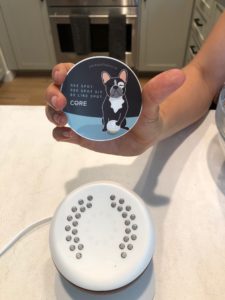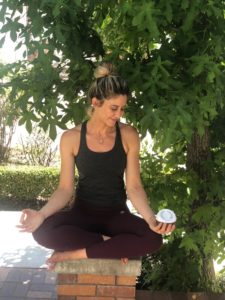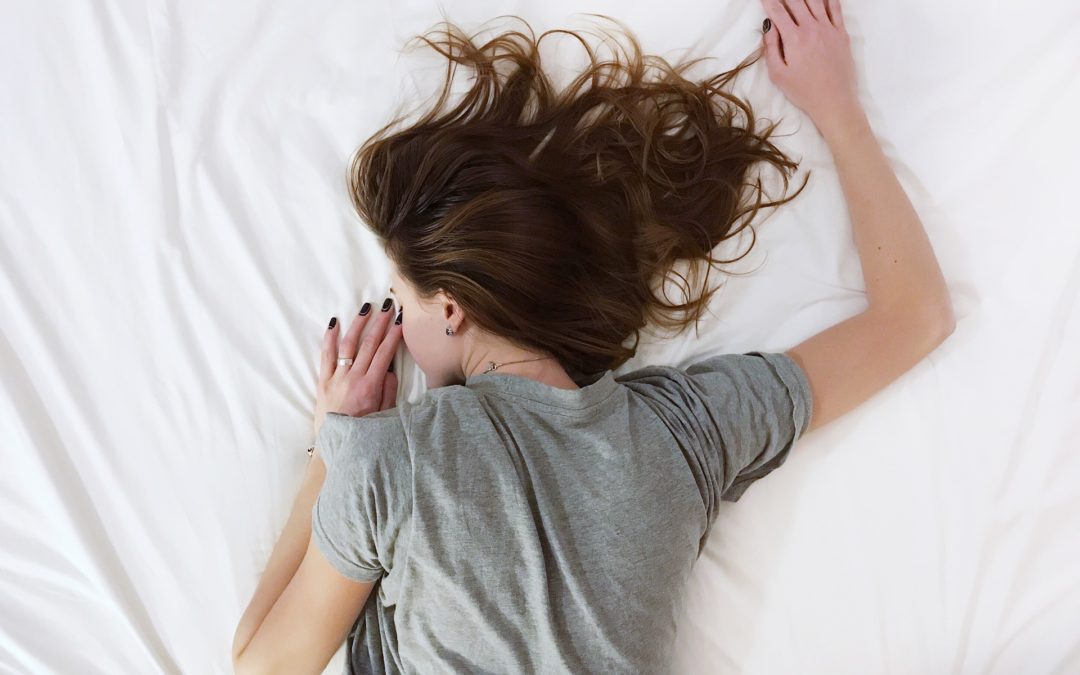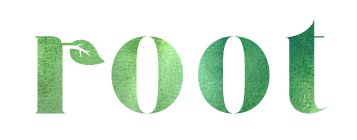by Jasmine | Sep 27, 2018 | Yoga Therapy
We’re super pumped about this review because it’s pretty revolutionary. If you love or are even slightly curious about the rise of meditation apps like Headspace, Calm and Insight Timer, meet newcomer Core Wellness.
Core Wellness, kicks mindful-tech to the next level by delivering software, hardware, and real data to the mix. This sets Core apart from the pack for a full meditation trainer experience.
And you don’t have to take our word for it, use our code for 10% discount off your own Core Wellness. Use Code: ROOTYOGATHERAPY at checkout.

What is Core Wellness
A dynamic all-in-one meditation training system that combines guided meditations with a hand-held device to focus your breathing.
What you get
- A small palm-sized meditation device to hold and focus on while you meditate. This little device is so cute and compact, and fits neatly on any bedside table or tucked away on a kitchen counter. The device pulses (vibrates) while you meditate to sync your breath to the pulses. The stronger upward pulses is your signal to inhale, while the slower downward pulse is your signal to exhale.
- A great meditation app that provides guided meditations and data on your stress levels and heart-rate overtime.

What I loved
- Guided Meditations are soothing and clear. They are simple, clear and fluid and partner nicely with the vibrations. And the meditations are great even without the device.
- Vibrations help you time and find a nice rhythm to your breathing. The pulsing keeps you focused on what you’re doing and prevents you from drifting away from your meditation by gently redirecting your attention back to Core.
- Vibrations are not intrusive, rather they’re soothing.
- Device is really comfortable to hold.
- Tracks your heart rate to determine your stress or relaxation states and provides the breakdown at the end of each meditation.
- Can choose guided or unguided mediations and can customize the pulsing for the unguided meditations.
What I could do without
- Needs to stay charged, so may be hard if you’re someone who likes to meditate on the go or like me, simply forgets.
How I used Core
I charged up core for a few hours and then downloaded the app. Setting up the application is very straightforward and easy to follow. That night I laid in my bed and worked through the basic meditations before dozing off to sleep with Core by my side. The basic meditations are really soothing and introduce you to the pulsing. Core uses the pulsing in different ways. The first meditation teaches you to sync your breath to the vibrations of core. I think this is a great way to slow down and learn basic controlled breathing. I used to count my inhales and exhales, but with core you don’t have to occupy the mind with counting. The second meditation I tried used interval pulsing to help you stay present throughout your meditation. Let’s be real, meditating is hard. We all are challenged with drifting into thought or dozing off. Core’s gentle vibrations act as little reminders to reconnect you back with your meditation. The third mediation I used, offered peaceful sounds of the ocean waves and the pulsing was used as more of background throughout the meditations. I found it interesting to see the variability in my heart rate while meditating and how much time I was actually in a state of rest throughout the meditation. One practice showed that I only had 3:12 minutes of calm throughout the 7 minute meditation! Yikes! My goal over time is to continue working with core and increase my “calm time” in meditation.

by Jasmine | Sep 17, 2018 | Yoga Therapy
This week’s post comes from guest blogger Ellie Porter from sleephelp.org, your one-stop shop for resources and support in getting better sleep. At ROOT, we’re huge fans of sleep (Read: Sleep Right, not Tight) and love all of these tips and ideas on how to ensure your sleep patterns help and not hinder your healing journey.
Our bodies and minds need balance to travel along the path of self-healing. Whether we’re overcoming a big break-up, grieving the loss of a loved one or coming to terms with our need to change, we cannot fully heal without finding harmony in our lives.
At the core of that balance is our good friend sleep, which serves as the foundation for overall physical, emotional, and mental wellness. Without sleep, the body changes in ways that get in the way of how we feel about ourselves, our circumstances, and our healing.
While we all know that we need sleep to function, here are a few surprising reasons why you need it even more as you heal.
1. Without enough sleep, the pessimism starts flowing.
Whenever I’m tired, handling even the smallest aggravations becomes difficult. I’m not the only one who gets irritable when tired, as seen by the long line of grumpy people at Starbucks.
This is because when we don’t get enough sleep, the emotional center of our brains, called the amygdala, becomes hypersensitive to negative thoughts and events. The increased activity in this area of the brain expresses itself as increased irritability, aggression, anxiety, and/or sadness.
While the amygdala is busy being oversensitive, the prefrontal cortex gets quieter. This part of the brain controls our executive functions like attention, focus, reasoning, and decision-making. Sleep allows the prefrontal cortex to apply reason as we process emotions.
This imbalance caused by sleep loss increases our stress and anxiety levels, throwing us off our healing path. It’s harder to keep our positive vibes and more likely that we’ll revert back some of our limiting beliefs and coping mechanisms.
2. Sleepy people feel less in control of our healing.
This emotional imbalance trickles down to impact one of the most important parts of our emotional and mental healing journeys: Acknowledging that healing is within our full sphere of control. When we don’t get enough sleep, we have a difficult time seeing our problems in perspective AND recognizing that we can do something about them.
Additionally, some of the issues or circumstances that are out of your control – bad coworkers, noisy neighbors – suddenly feel like insurmountable obstacles rather than a stumbling block. At the same time the things within our control – our newfound patience, love, and acceptance – become that much harder to practice.
All are necessary for self-healing and all are nearly impossible because of sleep-deprived emotional imbalance.

3. Sleep loss increases our appetite for unhealthy food.
These emotional fluctuations can be magnified by the physical changes that take place if we’re struggling with sleeplessness. Take a healthy, well-balanced diet, for example. Sleep plays a regulatory role in appetite and metabolism. Lack of sleep causes the body to release more of the hunger hormone ghrelin and less of the satiety hormone leptin. It’s hard to feel full when our hormones are working against us.
I find myself reaching for comfort foods like chips, cookies, and brownies when I’m tired. These foods simply feel better when I haven’t gotten enough sleep but make it harder for me to stick to eating the foods I need to properly nourish myself and heal.
A 2016 study found that participants who slept 4.5 hours chose snack foods with 50 percent more sugar and twice the fat than when they’d slept 8.5 hours. These same participants reported that resisting these foods was much harder with less sleep. It was found that sleep deprivation stimulated the same rewards centers of the brain.
In fact, the reward center of the brain gets a “runner’s high” from high-fat, sugary foods when we don’t get adequate sleep. Unfortunately, self-healing is hard to do if the body doesn’t have the fuel it needs for optimum health.
Ways to improve the amount of time we sleep and our sleep efficiency.
Sleep efficiency is the number of hours we actually sleep versus the time we spend in bed. Your personal habits and behaviors have a powerful impact on your sleep. Sometimes all it takes is a few small shifts to improve your sleep outcomes like:
-
Get Comfortable: Find a supportive mattress that’s firm enough for your weight and preferred sleep style will help you sleep the best. You’ll also want to make sure your bedroom is cool, somewhere between 60 to 68 degrees, with as little light as possible.
-
A Consistent Bedtime: The human body loves consistency. Waking up and going to bed at the same time every day helps your body follow the regular 24-hour cycles, called circadian rhythms, that control your sleep patterns. The more you follow these cycles the stronger and more consistent they become.
-
Relaxing Bedtime Routine: A relaxing bedtime routine may be one of the best ways to strengthen your self-healing journey. Both yoga and meditation have been shown to help the mind and body relax for better sleep. Consistent meditation can strengthen the connection between the prefrontal cortex and amygdala and reduce the size of the amygdala so that negative thoughts and emotions have less power over your actions. More traditional bedtime routines may include reading a book, listening to quiet music, or taking a warm bath. Basically, any activity that helps you feel calm and relaxed.
-
Healthy, Evenly-Spaced Meals: Healthy, well-balanced meals spaced evenly throughout the day help the brain to recognize when to start the release of sleep hormones. Regular meals also prevent indigestion and discomfort from interfering with the onset of sleep.
-
More Time Outside: Natural light is absorbed by special photoreceptors in the eyes and travels directly to the circadian region of the brain. Thus, light plays an integral role in the timing of your sleep cycle. The more time you can spend outside in the sunlight, the better your brain is able to correctly adjust the release of sleep hormones. Take a walk outside, sit on your front porch, or use your lunch break to get some fresh air.
Adequate sleep is a part of creating the balance we need to be the person were intended to be. With sleep is a priority, we are better able process and learn along our self-healing journey.






Recent Comments